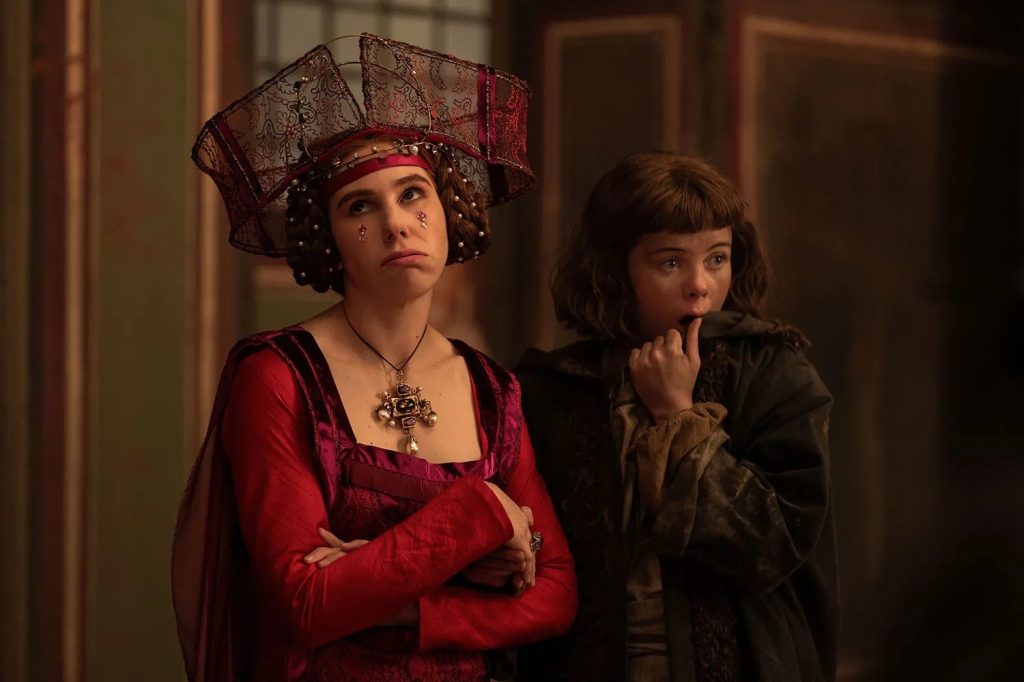Unless you majored English and shoehorned a mention of it into your Chaucer paper to try to get extra marks, you probably haven’t even heard of Boccaccio’s The Decameron, let alone read it. Which no doubt partly explains Netflix’s decision to give it the Bridgerton treatment: no one, anywhere, is liable to complain about their most cherished classic being massacred.
I had to look up who was responsible for this atrocity of a show, so I could check who to hate
But massacred it has been. Just as Bridgerton drives a coach and horses — or bulldozer with flashing rave lights and klaxons, more like — through anything that might remotely have resembled Jane Austen’s England, so this Netflix “adaptation” does for fourteenth century Florence. The costumes (generic late medieval) are wrong; the hairstyles are wrong; the sense of period and place is wrong. They could have called it the Mabinogian or the Mahabharata, for all the difference it makes, so vauntingly philistine and casual is its nod to the alleged source material.
Still, none of this would matter if it were as funny as it thinks it is. It attempts to be a black comedy set, like Boccaccio’s work, in a rural Tuscan villa to which various noblemen and women have fled in order to escape the plague ravaging Florence. In the original book they pass the time by telling 100 stories about lust, greed, religious belief, social satire and so on. But in the TV version, they just romp farcically like it’s Carry On Up The Black Death.
Possibly I’m just the wrong generation for this drivel. Younger viewers, for example, may not be as irritated as I am by hearing twentysomething female aristocrats from the Italian Rennaissance saying stuff like “Ugh! You’re so annoying!” in the same intonation as a contestant on Love Island. Or peasants exclaiming “Eff yeah, Signora!” as the soundtrack bursts into Depeche Mode. And there are far, far, far too many jokes about the fact that everyone, everywhere is dying of plague, which might be amusing, at least for the first time, if you’ve never seen Monty Python and the Holy Grail.
It has a decent enough cast, ranging from John Hannah (who doesn’t have much to do as a “man dying of plague” except lie in bed, coughing) to Saoirse-Monica Jackson (from Derry Girls) and, probably my favorite so far, Tanya Reynolds (from Sex Education) as a tricksy maidservant. But the dialogue they have been given by showrunner Kathleen Jordan just isn’t up to the job and even the better actors tend to ham it up at a level not much above a high-end village panto. As the Pythons would no doubt have put it: run away, run away.
But if you were tempted to imagine that period drama couldn’t get any worse, here is Peacock’s Those About to Die trundling by on its chariot and yelling: “Hold my cervisia!” I had to look up who was responsible for this atrocity of a show, set in and around the Colosseum of late Imperial Rome, just so I could check who to blame or hate. “Based on a book by Daniel P. Mannix,” it said, but it couldn’t be his fault, I surmised, because he wrote it as long ago as the 1950s, and it was the basis for the distinctly superior (if frankly still a bit overrated) Gladiator. No, I think the people who probably most deserve to be fed to the lions for this are writer Robert Rodat and director Roland Emmerich.
Emmerich is the German best known for action spectaculars such as Independence Day. The upside of this is that you are in for some white-knuckle chariot races and gladiatorial spectacles drenched in severed limbs and gore. But it also means an excess of brainlessness, both literal and metaphorical. For example, early on there’s a hunting scene in which an absurdly implausible, ludicrously magnificent CGI lion is tracked down and captured for use in the arena. But all you’re thinking — or I was, anyway — is: “That is not a real lion.”
Rodat doesn’t seem to have done a lot that’s much cop since Spielberg’s Saving Private Ryan, which, with hindsight, was actually quite silly and somewhat insulting. But his latest creation plumbs new depths. It’s just a ragbag of every Roman trope going: star chariot drivers knocking off a woman in a brothel who turns out to be a senator’s wife; noble Numidian warriors snatched unjustly from their idyllic African home to fight in the dust of the arena; plebs who, through aggression, cunning and business savvy, have risen from the mire to corner the market in 1st century bloodsports. The dialogue is crudely expository and devoid of wit.
These clichés might work if it weren’t all so rushed and cursory. Rather than allowing viewers a bit more space to like or loathe the characters, it hurries breathlessly from incident to incident as if terrified that the viewer might find the most blood-spattered, sexually licentious, intrigue-ridden period in the history of the world ever so slightly dull.
Anthony Hopkins is in it briefly as the Emperor Vespasian. But you’ll barely notice — if you can be bothered to watch, which I wouldn’t.
This article was originally published in The Spectator’s UK magazine. Subscribe to the World edition here.






















Leave a Reply